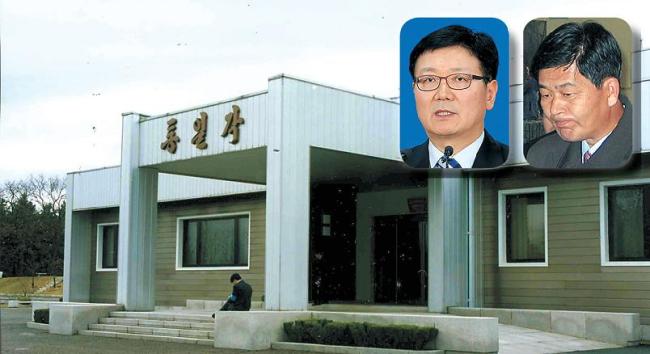Inter-Korean talks augur war of nerves
Seoul wants to prevent recurrence of Gaeseong suspension; Pyongyang seeks to resume it first
By Korea HeraldPublished : July 5, 2013 - 20:28
Another tough battle of nerves is expected at the inter-Korean talks over the suspended Gaeseong industrial park on Saturday as the two sides remain poles apart over how to normalize it.
The working-level meeting will begin at 10 a.m. in Tongilgak, a building at the inter-Korean truce village of Panmunjeom, raising cautious hopes for improvement in bilateral ties strained under Pyongyang’s nuclear saber-rattling.
Suh Ho, head of the Unification Ministry’s Inter-Korean Cooperation District Support Directorate, will lead Seoul’s three-member delegation while the North’s side will be headed by Park Chol-su, vice chief of the Central Special Zone Development Guidance General Bureau.
On the agenda are issues of checking factory facilities and equipment, which could be damaged without due care during the rainy season; moving finished products and raw materials to the South; and the normalization of the park.
The working-level meeting will begin at 10 a.m. in Tongilgak, a building at the inter-Korean truce village of Panmunjeom, raising cautious hopes for improvement in bilateral ties strained under Pyongyang’s nuclear saber-rattling.
Suh Ho, head of the Unification Ministry’s Inter-Korean Cooperation District Support Directorate, will lead Seoul’s three-member delegation while the North’s side will be headed by Park Chol-su, vice chief of the Central Special Zone Development Guidance General Bureau.
On the agenda are issues of checking factory facilities and equipment, which could be damaged without due care during the rainy season; moving finished products and raw materials to the South; and the normalization of the park.

Both sides share the need to resume the complex, once touted as the last remaining symbol of bilateral cooperation. But blaming each other for the suspension, which began in April, they differ over procedures of its normalization.
Sticking to its principle-based approach, Seoul demands that measures to prevent the recurrence of such a unilateral suspension be crafted first before restarting the complex from which Pyongyang raked in more than $90 million a year.
But Pyongyang wants to resume the park first and discuss related issues later amid its drive to revitalize the debilitated economy and deepening international isolation with a host of sanctions for its nuclear and missile tests.
On Friday, Seoul’s Unification Ministry spokesperson Kim Hyung-suk said the upcoming talks would focus on the “future-oriented” normalization of the park. He reiterated that Seoul seeks to forge a new inter-Korean relationship that goes in line with “international norms and common sense.”
A senior Cheong Wa Dae official told reporters that what matters most is finding the “fundamental solution” to insulate the park from political tensions.
Seoul’s first priority is to ensure first that Pyongyang will not halt the joint project at its own discretion again so as to prevent any possible business losses of South Korean firms operating in the risk-prone complex.
But the North is likely to demand the park resume first and claim that Seoul’s hostile policy toward Pyongyang led to its suspension.
On the issue concerning the checking of the factory facilities, the two sides are likely to reach some agreement as it is urgent to properly take care of them due to high temperatures and humidity during the monsoon season.
The 123 South Korean firms that had labor-intensive factories in the park earlier expressed their concerns over this, saying that they would push to relocate them to the South or overseas.
But the issue of transporting finished products and raw materials to the South is likely to be a tougher nut to crack given that it would be regarded as a first step toward the permanent shutdown of the complex.
Some observers said Pyongyang could use the issue to press Seoul to resume the factory operations first.
Optimists raise hopes that the lower-level talks could set the mood for higher-level talks to mend fences with each other. But as Pyongyang shows no signs of abandoning its nuclear ambitions, with Seoul demanding sincerity in its denuclearization, the onetime talks may not lead to any breakthrough in bilateral relations.
Critics said Pyongyang might seek the inter-Korean talks as Washington demanded that it should restore ties with Seoul first before any engagement with the U.S that could result in diplomatic or economic aid.
By Song Sang-ho (sshluck@heraldcorp.com)
-
Articles by Korea Herald










![[Hello India] Hyundai Motor vows to boost 'clean mobility' in India](http://res.heraldm.com/phpwas/restmb_idxmake.php?idx=644&simg=/content/image/2024/04/25/20240425050672_0.jpg&u=)








